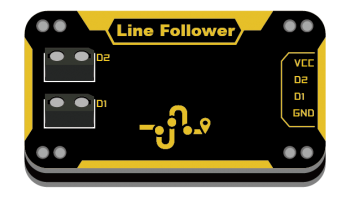“循迹”的版本间的差异
来自Labplus盛思维基百科
Tangliufeng(讨论 | 贡献) |
Jiangzhaohui(讨论 | 贡献) (→使用教程) |
||
| 第24行: | 第24行: | ||
== 使用教程 == | == 使用教程 == | ||
在安装循迹模块时约距离循迹线1CM左右 | 在安装循迹模块时约距离循迹线1CM左右 | ||
| + | === Arduino示例 === | ||
| + | <pre style="color:blue"> | ||
| + | int find1Pin =2; | ||
| + | int find2Pin =3; | ||
| + | int motor1Pin =7; | ||
| + | int motor2Pin =8; | ||
| + | int a,b; | ||
| + | void setup() { | ||
| + | Serial.begin(9600); | ||
| + | pinMode(find1Pin, INPUT); | ||
| + | pinMode(find2Pin, INPUT); | ||
| + | pinMode(motor1Pin, OUTPUT); | ||
| + | pinMode(motor2Pin, OUTPUT); | ||
| + | } | ||
| + | |||
| + | void loop() { | ||
| + | // put your main code here, to run repeatedly: | ||
| + | a=digitalRead(find1Pin); | ||
| + | b=digitalRead(find2Pin); | ||
| + | Serial.println(a); | ||
| + | Serial.println(b); | ||
| + | if((a==1)&&(b==1)) | ||
| + | { | ||
| + | digitalWrite(motor1Pin,LOW); | ||
| + | digitalWrite(motor2Pin,LOW); | ||
| + | } | ||
| + | if((a==1)&&(b==0)) | ||
| + | { | ||
| + | digitalWrite(motor1Pin,LOW); | ||
| + | digitalWrite(motor2Pin,HIGH); | ||
| + | } | ||
| + | if((a==0)&&(b==1)) | ||
| + | { | ||
| + | digitalWrite(motor1Pin,HIGH); | ||
| + | digitalWrite(motor2Pin,LOW); | ||
| + | } | ||
| + | if((a==0)&&(b==0)) | ||
| + | { | ||
| + | digitalWrite(motor1Pin,HIGH); | ||
| + | digitalWrite(motor2Pin,HIGH); | ||
| + | } | ||
| + | } | ||
| + | </pre> | ||
2018年1月7日 (日) 14:25的版本
概述
可用于循迹线检测,当检测到黑色时,输出高电平,检测白色时,输出低电平。
基于红外反射原理,红外发射二极管不断发射红外线,红外光电三极管接收反射回来的红外光。由于白色对红外反射强,黑色对红外反射弱,故此可检测黑、白线。
技术参数
- 工作电压:VCC 3.3-5V
- 模块尺寸:24x46x7.5mm
引脚定义
| VCC | 电源 |
| D1 | 对应D1红外接收触发值 |
| D2 | 对应D2红外接收触发值 |
| GND | 地 |
使用教程
在安装循迹模块时约距离循迹线1CM左右
Arduino示例
int find1Pin =2;
int find2Pin =3;
int motor1Pin =7;
int motor2Pin =8;
int a,b;
void setup() {
Serial.begin(9600);
pinMode(find1Pin, INPUT);
pinMode(find2Pin, INPUT);
pinMode(motor1Pin, OUTPUT);
pinMode(motor2Pin, OUTPUT);
}
void loop() {
// put your main code here, to run repeatedly:
a=digitalRead(find1Pin);
b=digitalRead(find2Pin);
Serial.println(a);
Serial.println(b);
if((a==1)&&(b==1))
{
digitalWrite(motor1Pin,LOW);
digitalWrite(motor2Pin,LOW);
}
if((a==1)&&(b==0))
{
digitalWrite(motor1Pin,LOW);
digitalWrite(motor2Pin,HIGH);
}
if((a==0)&&(b==1))
{
digitalWrite(motor1Pin,HIGH);
digitalWrite(motor2Pin,LOW);
}
if((a==0)&&(b==0))
{
digitalWrite(motor1Pin,HIGH);
digitalWrite(motor2Pin,HIGH);
}
}
